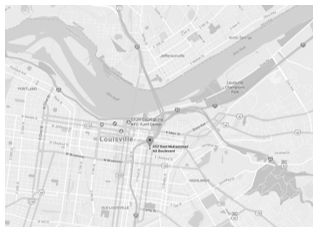Nursing assistant professor part of federal medical team deployed to hurricane-ravaged Puerto Rico
UofL School of Nursing Assistant Professor Montray Smith, M.S.N., M.P.H., R.N., at the Federal Medical Station in Manatí, Puerto Rico, where she provided care in the wake of Hurricanes Irma and Maria with a federal Disaster Medical Assistance Team.
As this year’s volatile Atlantic hurricane season progressed, Montray Smith knew it was a question of when – not if – she would be called to help.
Smith, a University of Louisville School of Nursing assistant professor, recently returned from a two-week deployment to Puerto Rico where she provided medical care in the wake of Hurricanes Irma and Maria with a federal Disaster Medical Assistance Team (DMAT).
Part of the National Disaster Medical System, DMATs across the country are made up of physicians, nurse practitioners, paramedics and other health care professionals who leave their regular jobs and quickly mobilize to provide medical aid when local and state resources are overwhelmed after natural disasters or terrorist attacks. They also prepare to respond to major national events, including presidential inaugurations, if an emergency arises.
“Most health care providers want to jump in and help during a disaster, and that’s what we get to do,” said Smith, M.S.N., M.P.H., R.N.
Smith’s DMAT, along with personnel from the U.S. Public Health Service and non-governmental agencies, set up a federal medical station in Bayamón and treated 150-200 people every day at a similar station in Manatí.
“The patients were incredibly resilient. They did what they had to do to survive,” Smith said. “Their infrastructure is gone and it’s going to be a long time before the island recovers from the storms.”
Traffic lights and electrical poles were gone, buildings were destroyed and trees were scattered. Still lacking electricity in their homes, some patients needed power to operate ventilators and feeding tube machines. Most were treated for conditions related to mold exposure, including pink eye, asthma, nausea and vomiting. Critical patients were stabilized and transported by the Army to local hospitals.
Smith takes pride in caring for disaster victims as well as bringing relief to fellow medical personnel who reside in the ravaged areas.
For 15 years, she has been a member of the DMAT based in Jacksonville, Fla., which last mobilized after Hurricane Sandy in 2012.
Her first deployment was to Pensacola, Fla., after 2004’s Hurricane Ivan where her team supported a badly damaged hospital that was depending on generators and had no running water.
“The hospital staff were taking care of patients while not knowing if their families were okay or if their homes were still standing,” Smith said. “We came in the middle of the night to set up and started seeing patients the next morning. The staff were so relieved that we were there to help. We told them, ‘Go home. Take care of your family. Take care of yourself.’”
Smith’s DMAT could be re-deployed to Puerto Rico after Thanksgiving.
